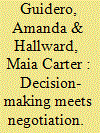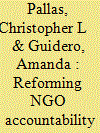| Srl | Item |
| 1 |
ID:
148543


|
|
|
|
|
| Summary/Abstract |
The Israeli-Palestinian conflict attracts much scholarly and diplomatic attention. However, despite Secretary of State John Kerry’s determination during the 2014 round of negotiations, the parties are no closer to reaching a negotiated agreement over twenty years after the signing of the Oslo Accords. This article explores an under-examined aspect of negotiation, the decision to enter into talks, using poliheuristic theory. We examine the decision-making calculus of Palestinian president Mahmoud Abbas in his bid for Palestinian statehood at the United Nations, a decision to not negotiate. We ask not only why did Abbas choose to bypass US-mediated negotiations, but why he chose to pursue Palestinian statehood at the UN. In our analysis and discussion, we identify gaps in the existing decision-making and negotiation literatures and ways to better incorporate questions of power asymmetry and the complexity of context into poliheuristic theory.
|
|
|
|
|
|
|
|
|
|
|
|
|
|
|
|
| 2 |
ID:
151247


|
|
|
|
|
| Summary/Abstract |
Proposed solutions to INGO accountability problems frequently conflict. Dominant scholarship focuses on promoting self-regulation within the INGO community, while an alternative body of literature focuses on generating external incentives for accountability, using state/IO regulations or conditional funding. This article analyzes the causes and implications of this disjuncture. We first show that self-reform requires a high degree of INGO autonomy, whereas external reform requires a high degree of donor control. We next conceptualize INGO autonomy as a price funders pay for INGO services. Using this framework, we show that INGO self-reform implicitly assumes that the demand for INGO services outstrips the supply (scarce supply), forcing funders to pay a high price in terms of INGO autonomy. Proposals for external incentives assume the opposite (abundant supply), such that competition among INGOs effects a downward pressure on autonomy, increasing donor control. These findings reveal that solutions to NGO accountability cannot be an “all of the above” proposition. Moreover, because demand for services may vary between sectors of NGO activity, effective solutions need to be sector-specific, rather than universal.
|
|
|
|
|
|
|
|
|
|
|
|
|
|
|
|